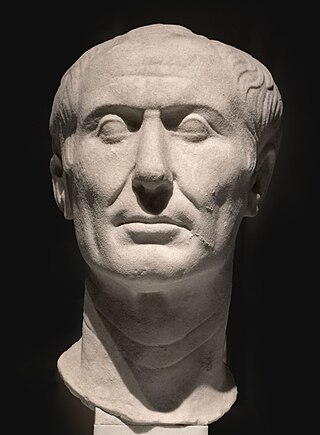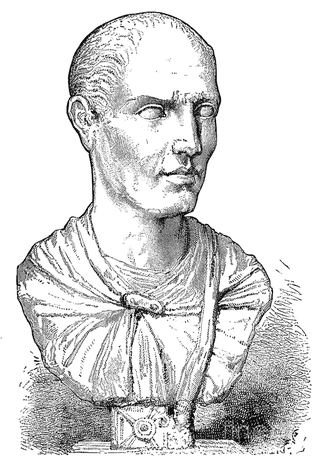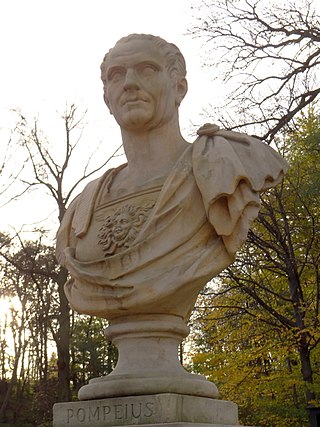Related Research Articles

Gaius Julius Caesar was a Roman general and statesman. A member of the First Triumvirate, Caesar led the Roman armies in the Gallic Wars before defeating his political rival Pompey in a civil war, and subsequently became dictator from 49 BC until his assassination in 44 BC. He played a critical role in the events that led to the demise of the Roman Republic and the rise of the Roman Empire.
This article concerns the period 69 BC – 60 BC.
This article concerns the period 79 BC – 70 BC.

Lucius Cornelius Sulla Felix, commonly known as Sulla, was a Roman general and statesman. He won the first large-scale civil war in Roman history and became the first man of the Republic to seize power through force.

Lucius Licinius Lucullus was a Roman general and statesman, closely connected with Lucius Cornelius Sulla. In culmination of over 20 years of almost continuous military and government service, he conquered the eastern kingdoms in the course of the Third Mithridatic War, exhibiting extraordinary generalship in diverse situations, most famously during the Siege of Cyzicus in 73–72 BC, and at the Battle of Tigranocerta in Armenian Arzanene in 69 BC. His command style received unusually favourable attention from ancient military experts, and his campaigns appear to have been studied as examples of skillful generalship.
Publius Nigidius Figulus was a scholar of the Late Roman Republic and one of the praetors for 58 BC. He was a friend of Cicero, to whom he gave his support at the time of the Catilinarian conspiracy. Nigidius sided with the Optimates in the civil war between Julius Caesar and Pompeius Magnus.

The gens Pompeia was a plebeian family at ancient Rome, first appearing in history during the second century BC, and frequently occupying the highest offices of the Roman state from then until imperial times. The first of the Pompeii to obtain the consulship was Quintus Pompeius in 141 BC, but by far the most illustrious of the gens was Gnaeus Pompeius, surnamed Magnus, a distinguished general under the dictator Sulla, who became a member of the First Triumvirate, together with Caesar and Crassus. After the death of Crassus, the rivalry between Caesar and Pompeius led to the Civil War, one of the defining events of the final years of the Roman Republic.

The gens Marcia, occasionally written Martia, was one of the oldest and noblest houses at ancient Rome. They claimed descent from the second and fourth Roman Kings, and the first of the Marcii appearing in the history of the Republic would seem to have been patrician; but all of the families of the Marcii known in the later Republic were plebeian. The first to obtain the consulship was Gaius Marcius Rutilus in 357 BC, only a few years after the passage of the lex Licinia Sextia opened this office to the plebeians.
Marcus Terentius Varro Lucullus, younger brother of the more famous Lucius Licinius Lucullus, was a supporter of Lucius Cornelius Sulla and consul of ancient Rome in 73 BC. As proconsul of Macedonia in 72 BC, he defeated the Bessi in Thrace and advanced to the Danube and the west coast of the Black Sea. In addition, he was marginally involved in the Third Servile War.
The gens Terentia was a plebeian family at ancient Rome. Dionysius mentions a Gaius Terentius Arsa, tribune of the plebs in 462 BC, but Livy calls him Terentilius, and from inscriptions this would seem to be a separate gens. No other Terentii appear in history until the time of the Second Punic War. Gaius Terentius Varro, one of the Roman commanders at the Battle of Cannae in 216 BC, was the first to hold the consulship. Members of this family are found as late as the third century AD.

The gens Minucia was an ancient Roman family, which flourished from the earliest days of the Republic until imperial times. The gens was apparently of patrician origin, but was better known by its plebeian branches. The first of the Minucii to hold the consulship was Marcus Minucius Augurinus, elected consul in 497 BC.
Quintus Caecilius Metellus Nepos was an ancient Roman politician during the Late Republic. He was a son of Quintus Caecilius Metellus Nepos and served as tribune of the plebs in 62 BC, consul in 57 BC, and the governor of Hispania Citerior from 56–55 BC.
Lucius Valerius Flaccus was the suffect consul who completed the term of Gaius Marius in 86 BC. In the Roman Republic, Marius had fought a series of civil wars against Lucius Cornelius Sulla Felix, both leaders of their respective factions. Flaccus was considered a staunch supporter of Marius and Lucius Cornelius Cinna, the latter of whom shared his consulate and succeeded Marius as faction leader.

The gens Caecilia was a plebeian family at ancient Rome. Members of this gens are mentioned in history as early as the fifth century BC, but the first of the Caecilii who obtained the consulship was Lucius Caecilius Metellus Denter, in 284 BC. The Caecilii Metelli were one of the most powerful families of the late Republic, from the decades before the First Punic War down to the time of Augustus.
Marcus Marius was a quaestor of the Roman Republic in 76 BC and proquaestor under Quintus Sertorius's government in exile in Spain. Marius was sent by Sertorius to Mithradates of Pontus as an advisor and military commander in the Third Mithridatic War. He is named as or more likely confused with a Varius in Appian.
The career of Julius Caesar before his consulship in 59 BC was characterized by military adventurism and political persecution. Julius Caesar was born on 12 July 100 BC into a patrician family, the gens Julia, which claimed descent from Iulus, son of the legendary Trojan prince Aeneas, supposedly the son of the goddess Venus. His father died when he was just 16, leaving Caesar as the head of the household. His family status put him at odds with the Dictator Lucius Cornelius Sulla, who almost had him executed.

The siege of Mytilene was a military investment of the city of Mytilene on the island of Lesbos in 81 BC.
The Fimbrian or Valerian legions were two Roman legions which served and fought in all three wars against King Mithridates of Pontus, one of the Roman Republic's chief adversaries during the 80s, 70s and 60s BC. They became a body of long serving legionaries known for their fierce fighting reputation and also, more infamously, for mutiny and abandoning their commander. The legions take their name from the consul Lucius Valerius Flaccus, who first recruited them in 86 BC, and from his subordinate, Gaius Flavius Fimbria, who took command of the legions after inciting a mutiny and murdering Flaccus.
Quintus Minucius Thermus was a Roman politician.
References
- ↑ T.R.S. Broughton, The Magistrates of the Roman Republic, vol. 2 (New York 1952), pp. 76, 78, 81, citing Suetonius, Divus Iulius 2.1, where he is identified as a praetor, and David Magie, Roman Rule in Asia Minor (Princeton University Press, 1950), vol. 1, p 246f. and vol. 2, p. 1124, note 41.
- ↑ Arthur Keaveney, Lucullus: A Life (Routledge, 1992), p. 182 online. Keaveney argues that Minucius assumed his post in Asia in 79 (pp. 182–187).
- ↑ Philip de Souza, Piracy in the Graeco-Roman World (Cambridge University Press, 2002), p. 123 online.
- ↑ Harold B. Mattingly, "C. Verres and the Pirates," in From Coins to History: Selected Numismatic Studies (University of Michigan Press, 2004). p. 180, note 10 online.
- 1 2 Ronald T. Ridley, "The Dictator's Mistake: Caesar's Escape from Sulla," Historia 49 (2000) 227–228.
- ↑ Matthias Gelzer, Caesar: Politician and Statesman, trans. Peter Needham (Oxford: Blackwell, 1968), ISBN 0-631-10430-5